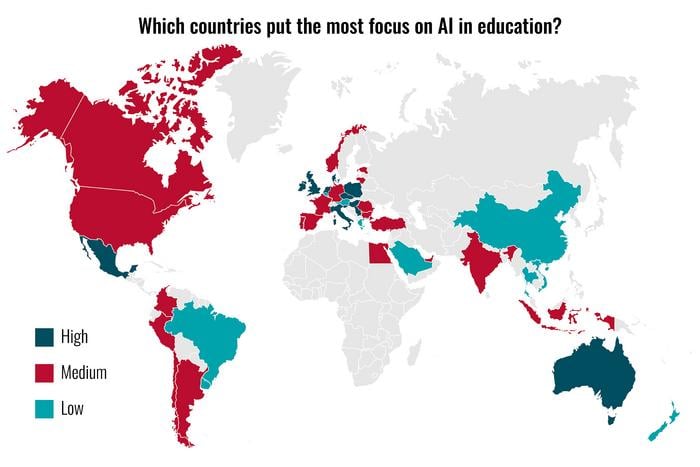Let's Master AI Together!
Countries Race to Build AI-Ready Workforces
Written by: Chris Porter / AIwithChris

Source: Science Blog
Global Pursuit of AI-Ready Workforces
The race is on! As artificial intelligence continues to revolutionize industries worldwide, countries are stepping up their efforts to cultivate AI-ready workforces. The transformative potential of AI encompasses automation, data analytics, and intelligent systems, making it imperative for nations to align their labor forces with these trends. With the United States leading the charge in investments and innovations, the global landscape is rapidly changing as countries strive to harness the benefits of AI technologies.
Over the past decade, the United States has accounted for approximately 60% of global AI investments, making it a commanding presence in the AI landscape. This vast investment has not only facilitated cutting-edge research and development but has also birthed around a quarter of the world's AI startups, fostering an environment ripe for innovation. The success of the U.S. is attributed to its unique combination of a flexible economy, access to vast data resources, and a culture that celebrates creativity and entrepreneurship. As a result, dynamic job creation is visible across various sectors that integrate AI technologies into their operations.
However, the landscape is competitive. Countries like China are rapidly closing the gap, with substantial investments aimed at becoming a global AI powerhouse. By 2030, China aims for its AI core industry to exceed one trillion yuan, reflecting its ambition to be at the forefront of AI innovation. This commitment underscores how China intends to revolutionize not just its economy but also the global market by creating a highly skilled workforce that is equipped to leverage AI technologies.
The Robust AI Ecosystem in Singapore
In the race to develop AI-ready workforces, Singapore stands out as a remarkable example, boasting a strong AI ecosystem characterized by high hiring rates for AI talent and a well-implemented national AI strategy. The country's investment in digital infrastructure enables seamless access to AI initiatives, allowing businesses to innovate and adopt AI solutions swiftly.
Singapore's national AI framework focuses on open access foundation models, which facilitate data sharing and collaborative efforts among businesses and academic institutions. These initiatives foster an environment where AI can thrive, ensuring that various sectors—from healthcare to finance—leverage AI effectively. With a government that actively supports policies conducive to AI growth, Singapore is ideally positioned to continue leading in AI readiness on a global scale.
India: The Emerging AI Player
<pIndia is carving out its own niche in the global AI landscape, making significant strides with a commitment of $1.2 billion towards AI projects across diverse sectors. This financial backing reflects India's recognition of the critical role AI plays in enhancing economic growth, innovation, and job creation. Additionally, the implementation of the Digital Personal Data Protection Act signifies India's resolve toward fostering responsible AI development, prioritizing user privacy and ethical considerations in AI deployment.The initiatives taken by the Indian government aim to equip its workforce with essential skills through coordinated training programs and collaborations with educational institutions. By investing in AI education, the Indian government seeks to ensure that its workforce remains competitive in a world increasingly reliant on AI technologies. As India's commitment to AI continues to strengthen, its potential as a key player in the global AI race becomes increasingly evident.
The Middle Eastern AI Investment Surge
In recent years, the Middle East has emerged as a significant contender in the pursuit of AI readiness, with countries like Saudi Arabia and the UAE investing heavily in AI initiatives. Driven by a desire to diversify their economies and reduce reliance on oil, these nations are strategically aligning their investments to foster growth in the ICT sector. Saudi Arabia's Vision 2030 exemplifies this ambition, incorporating extensive funding for AI-related ventures and projecting that AI could contribute as much as $135.2 billion to its national economy by the target year.
Additionally, countries within the region are actively focusing on the development of human capital that can proficiently navigate the complexities of AI technologies. By creating educational frameworks that emphasize skill development and technical proficiency, nations in the Middle East are positioning themselves to harness the benefits of AI and drive their economies forward in a competitive global landscape.
The Global Consensus on AI Workforce Readiness
Despite these notable efforts to cultivate AI-ready workforces, a global study by Kyndryl has revealed a significant gap. The report indicates that a staggering 71% of business leaders believe that their workforces are not yet adequately prepared to effectively leverage AI. This data signals a pressing need for ongoing investment in education and training initiatives that equip workers with the skills necessary to thrive in an AI-driven economy.
This gap in readiness highlights the critical importance of collaborative efforts among governments, educational institutions, and industry leaders to implement comprehensive training programs aimed at upskilling workers. By prioritizing workforce education on emerging technologies such as AI, countries can build resilient workforces that are well-prepared to meet the evolving demands of the job market.
Conclusion: The Critical Importance of AI Policies
As the global race to build AI-ready workforces intensifies, it is crucial for nations to recognize the importance of developing strategies that foster innovation, skill development, and collaboration across sectors. With countries like the United States, China, Singapore, and India paving the way, the emphasis on cultivating capable workforces will undoubtedly shape the future dynamics of the AI landscape.
As companies and government entities alike continue to invest in AI infrastructure and training programs, the potential for creating a sustainable economic landscape stands to significantly increase. To learn more about the global efforts in shaping AI-ready workforces and the implications for the future of work, visit AIwithChris.com.
_edited.png)
🔥 Ready to dive into AI and automation? Start learning today at AIwithChris.com! 🚀Join my community for FREE and get access to exclusive AI tools and learning modules – let's unlock the power of AI together!
